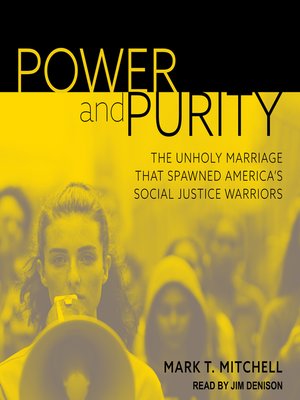Power and Purity
audiobook (Unabridged) ∣ The Unholy Marriage That Spawned America's Social Justice Warriors
By Mark T. Mitchell

Sign up to save your library
With an OverDrive account, you can save your favorite libraries for at-a-glance information about availability. Find out more about OverDrive accounts.
Find this title in Libby, the library reading app by OverDrive.



Search for a digital library with this title
Title found at these libraries:
| Library Name | Distance |
|---|---|
| Loading... |
Where did they come from, these furiously self-righteous "social justice warriors"?
Having declared that "God is dead," Friedrich Nietzsche identified the "will to power" as the fundamental force of human life. There is no good or evil in a Nietzschean world—only the interests of the strong. Reason and the common good have no place there.
As Nietzsche's ideas have permeated our culture, a new generation of radicals has embraced the rhetoric and tactics of the will to power. But the strength of America's residual Puritanism keeps them only half-baked Nietzscheans. More Christian than they care to admit, they cling to a moralism that Nietzsche would despise.
The incoherence of their mixed creed dooms social justice warriors to perpetual frustration. Their identity politics generates ever more radical demands that can never be satisfied, further fracturing a society in desperate need of a unifying myth. We seem to be left with only two options, Mitchell concludes—Nietzsche or Christ, the will to power or the will to truth. The choice is bracingly simple.
Having declared that "God is dead," Friedrich Nietzsche identified the "will to power" as the fundamental force of human life. There is no good or evil in a Nietzschean world—only the interests of the strong. Reason and the common good have no place there.
As Nietzsche's ideas have permeated our culture, a new generation of radicals has embraced the rhetoric and tactics of the will to power. But the strength of America's residual Puritanism keeps them only half-baked Nietzscheans. More Christian than they care to admit, they cling to a moralism that Nietzsche would despise.
The incoherence of their mixed creed dooms social justice warriors to perpetual frustration. Their identity politics generates ever more radical demands that can never be satisfied, further fracturing a society in desperate need of a unifying myth. We seem to be left with only two options, Mitchell concludes—Nietzsche or Christ, the will to power or the will to truth. The choice is bracingly simple.







